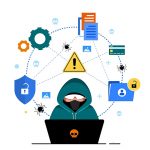
Your computer suddenly starts acting up. The first sign is usually that it has become sluggish - slow to respond to commands, load web pages and open documents. This could be age – if your computer is five to eight years old, it may just be showing its wear and tear. It may be that your RAM (Random Access Memory) is still at the old standard of 4GB, which doesn’t really cut it anymore with the size of modern programs.
BUT, it may very well be a malware/virus infection. If it is a company computer, there is cause for concern, but not alarm. Notify your IT support department or outsourced Managed IT Services to run a check and remove the malware.
However, if you are a consumer with problems on your home computer, a little alarm would be a sensible thing. You can try running Windows Defender, but that app offers only basic security protection and may not find a sophisticated virus. If you have someone that works on your computer, call them ASAP. If not, you are stuck with using potentially bad IT by googling up questionable ‘IT Guys’ in your area.
How can you tell? Here are ten signs that reliably point to an infection:
1) Slow to boot and slow to perform internal tasks
This is about non-internet activities. When you press the ‘ON’ button, does it take longer than usual to boot up and display your desktop? Longer to open a Word or Excel file? And then, do you wait longer when you type before the words appear in a document? Bad signs all.
2) Suspicious noises and hard drive activity
An overly active hard drive will make noise on its own and may be because the virus is busy working. The computer may also produce noises you’ve never heard before. Anything unusual – beeping is the very worst sign – is cause for concern.
3) Maxed-out storage
Some malwares copy files or create new data in the system which eat up your storage space. These files are hard to find – it’s not like they name themselves ‘virus’. If you do a file search, don’t just start deleting files in sensitive areas like your registry.
4) Error messages and crashes
Apps should not just crash or start producing error messages on their own. It could be a problem with a recent update (happens frequently with Microsoft updates), but there’s a good chance that the virus has introduced a malicious code into your computer.
5) Suspicious email activity
A typical hardworking virus wants to spread its message to as many people as it can. It will start with your address book. If colleagues or friends start asking about suspicious emails ‘you’ sent them, you can be sure that malware is doing it.
6) Unusual Browser performance
Especially if your home page has been redirected to a spam site or the entire browser is sluggish. This is indicative of malware.
7) Pop-up windows
If you suddenly start getting pop-up ads in spite of your pop-up blocker, this is a sure sign of infection. Even if the pop-up tells you ‘a virus has been detected’ DO NOT CLICK ON THEM!
8) Missing files
Malware routinely takes, moves, or deletes files. If you worked on something yesterday and today you can’t find it even with a file search, something is very wrong.
9) Unusually high network activity
Viruses don’t just get in your computer and sit there – they have a purpose – copying and exfiltrating our data, grabbing your email to send scams to everyone in your address book, and so forth. They are busy little bees, and they work your system very hard.
10) Disabled security features
You get a legitimate window that says your firewall is turned off. BUT, when you go to turn it on, you can’t. This is a form of virus self-preservation.
11) Unplanned reboots
Perhaps the most aggravating sign of all. You are busy working, and your system shuts down and restarts on its own. This could be a hardware issue, as most modern computers are designed to shut down if internal components like the processor get too hot. This may go hand in hand with a strange noise – such as the fan going out. But many malwares cause this to happen as well.
If you are seeing one or several of these signs, alert your IT services provider.
Frequently Asked Questions
Is there a 100% free antivirus?
There are, but there’s no such thing as a free lunch. Most free antivirus only offer the most basic protection. Cyber crooks are to smart to let that stop them. Free AV only offers a false sense of security.
How long does a virus scan take?
Most AV scanners offer at least two scan versions: 1) a partial scan – just your main drives, which can take as little as 15 to 30 minutes - or 2) a full system scan which can take several hours, depending the amount of memory and space on the hard drive you have.
How often should you do a full scan on your computer?
The general rule is to perform a full system scan at least once a week.
How can I remove virus from my computer without antivirus?
HT Tech offers a step by step procedure HERE.
What is the most common computer virus?
ProofPoint lists the most prevalent viruses and explains the differences HERE.
How secure is your network?
As a reputable member of the IT Support Los Angeles community since 2002, IT Support LA offers a FREE, no-risk network and security assessment. It is a non-intrusive scan that allows us to deliver a comprehensive report that is yours to keep. No strings, and no obligation to ever use our Managed IT Services.
The best defense is the best Cybersecurity to protect your data from theft, and a top-notch Managed IT Services firm to ensure continued reliability and defenses against newly emerging threats.
With our 100% Money Back Guarantee in writing, we offer a risk-free way for prospective clients to try us out. Because we do not require a ‘hard’ contract, our clients can fire us at any time with 30 days’ notice. We have to be good.
Among the Managed IT services we provide:
IT HelpDesk Service
Onsite IT Support
Cybersecurity
Cloud migration and management
Email migration services
Backup and disaster recovery
VoIP phone systems
IT disposition and recycling
Office moves
White label services (IT to IT)
For more information, or to receive your FREE no-risk network and security assessment, just fill out the form on this page or call us at: 818-805-0909


